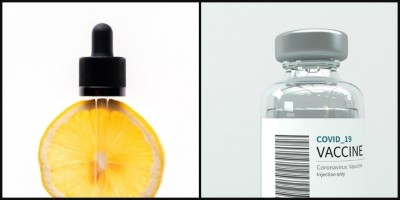When fake health news goes viral: New study examines what makes people susceptible

A new study from researchers at the University of Kansas journalism & mass communication looked at what influences people to be susceptible to false information about health.
Hong Tien Vu, assistant professor of journalism & mass communications, and Yvonnes Chen, associate professor of journalism & mass communications at KU, co-wrote the study. They will officially present their findings at the 2021 International Communication Association Conference in May.
Chen and Vu shared a fake news story that claimed vitamin B17 deficiency could cause cancer. The made up story was shared with over 750 participants. From there, the researchers measured if the way the article was presented impacted how participants perceived its credibility and whether they would adhere to the article's recommendations or share it on social media. This included things like author credentials, writing style and whether the article was labeled as "suspicious" or "unverified.”
Different versions, same story
Eight versions of an article verified as false with respondents that claimed a lack of vitamin B17, which does not exist, could be a cause of cancer. In one version, it included a doctor's byline, including a short description of her medical credentials. In another version, the author was described as a mother of two with a background in creative writing who was a lifestyle blogger in another. Some versions followed a journalistic style, while others used more casual language.
The results suggest that author credentials and how the story was written did not have significant differences on how people perceived its credibility, whether they would adhere to its recommendations or share it. However, those who saw the article presented with any sort of flagging stating it was not verified information were significantly less likely to find it credible, adhere to recommendations or share it.
Respondents who showed higher levels of social media efficiency, or were more tech savvy, evaluated information more carefully and reported they would be less likely to share the article. Health orientation, or whether or not respondents were interested in or sought out health information, did not play a role in discerning accuracy of information. It is significant, however, as those highly interested in health information are more likely to share news they find, whether credible or not, the authors noted.
“This study demonstrates that consumer access to accurate and reliable information about healthcare products and services, including dietary supplements, is critical,” said Brian Wommack, senior vice president, communications, Council for Responsible Nutrition (CRN). “Throughout the pandemic especially, more consumers are seeking products and resources to support their health and wellness. As the 24- hour news cycle inundates consumers with a barrage of information, some fact and some fiction, it matters where the public gets their facts about dietary supplements.”
Tech’s role in the infodemic
"We wanted to test two skills that are often employed in media literacy training programs around the world: author credentials and writing style, as well as flagging," Vu said. "The results suggest relying on audience members to do the work to determine fake news may be a long way to go. When people have to evaluate the credibility of information, it requires mental work. When surfing the web in general, we tend to rely on big tech companies to verify information."
Indeed, many social networks have responded by banning certain content, labeling it ‘false’ and tweaking their algorithms to limit their reach.
Facebook maintains that they are committed to reducing the spread of false news on its platform, saying “We remove fake accounts and disrupt economic incentives for people that share misinformation. We also use signals, like feedback from our community, to identify stories that may be false. In countries where we work with independent third-party fact-checkers, stories rated as false by those fact-checkers are shown lower in News Feed. If Pages or domains repeatedly create or share misinformation, we significantly reduce their distribution and remove their advertising rights.”
And Instagram, which is owned by Facebook, updated their “claims that violate our COVID-19 and vaccine policies” in early February to inform users on what they can and cannot post as it relates to covid-19, face masks and vaccines. Beginning in early 2020, Instagram has took measures to prevent covid-related misinformation, including providing educational resources, labeling all posts related to covid-19 and the vaccine, and blocking hashtags that contain false vaccine information.
Twitter also has COVID-19 misleading information policy, which includes a ‘false news’ labeling system and account locks and permanent suspension in more severe cases.
"Whenever we see information that has been flagged, we immediately raise our skepticism, even if we don't agree with it. Big tech companies have a very important role to play in ensuring a healthy, clean information environment," Vu said.
Seek advice outside of social media
Wommack told NutraIngredients-USA that they encourage consumers to keep an open dialogue with their healthcare practitioner about the dietary supplements they’re taking or thinking about taking in the future. They also recommend that consumers do their own research about a particular company and the supporting science for their ingredients.
“Consumers can start their research with government sites, such as the Food and Drug Administration or the Office of Dietary Supplements. Trusted organizations like CRN can also help consumers make smart choices and provide accurate and reliable information about dietary supplements. Consumers can find a full list of responsible member companies, their brands and branded ingredients on CRN’s website. Supplement users can also use the Supplement OWL (Online Wellness Library) to help them easily identify products, their ingredients and the companies behind them," Wommack said.
Source: University of Kansas
March 2021
"Study examines what makes people susceptible to fake health news: Source credibility, how info is presented have little influence; tagging unverified content makes difference."
Authors: H. Vu et al.








